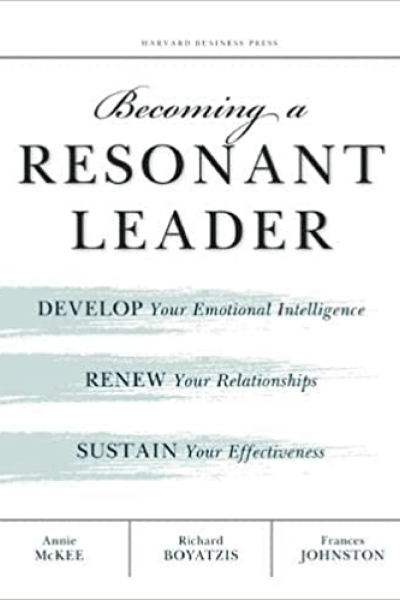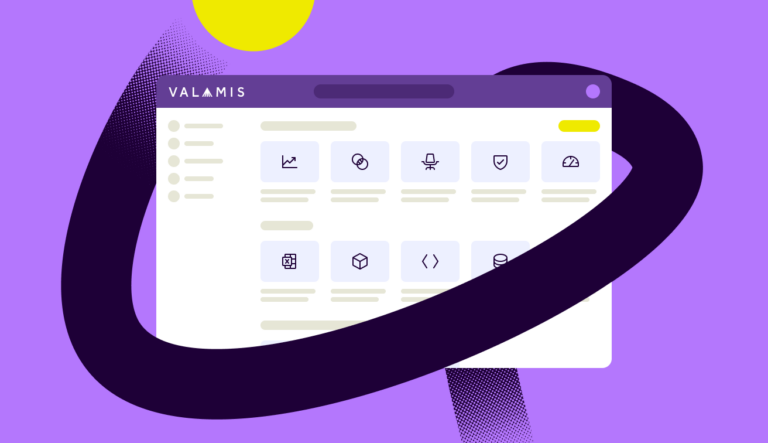Emotional intelligence in the workplace
What exactly is EI and why is it important in the workplace? Learn how it can affect business performance and job progression.

Looking to understand emotional intelligence (EI) and how it applies to the workplace? You’ve come to the right place.
In this article, we will clarify what EI is, its importance in the workplace, and how it affects business performance and job progression. In addition, you will learn how to improve EI for yourself and the workforce, equipping your team with the skills needed to excel in the workplace, and find new ways to help the business grow.
This article will help you learn:
- What is emotional intelligence
- The history of emotional intelligence research
- Why emotional intelligence is important in the workplace
- Daniel Goleman’s pillars of emotional intelligence
- How to improve emotional intelligence in the workplace
- Tips for implementing emotional intelligence in the workplace
- 5 books to read about emotional intelligence
What is emotional intelligence?
Emotional intelligence (EI) describes a person’s ability to identify, understand, manage, and harness their own emotions and those of the people around them. EI is a vital skill for interpersonal communication and has become an area of interest across multiple disciplines, including the workplace.
Employees acting with EI generally produce advantages in their career development and provide benefits for the organization. A workforce made up of emotionally intelligent individuals improves relationships within the team and helps to generate a positive work culture.
Emotionally unintelligent staff struggle to manage their feelings. As a result, they often act impulsively without clear thought to their behavior and that the consequences of their actions won’t affect themselves or the people around them.
Developing EI can help individuals better understand themselves, equipping them with the skills needed to guide future thought processes and actions.
Examples of emotional intelligence in action in the workplace include:
- Constructive feedback instead of personal criticism and challenging behaviors, not people.
- Supporting colleagues through recognizing their emotions and working to reduce stress.
- Keeping calm and productive under pressure.
- Helping to resolve conflicts that arise between team members.
- Creating a workplace where people are free to express themselves openly.
Another term for EI is emotional quotient (EQ), with researchers often comparing it to intelligence quotient (IQ). While IQ measures a person’s knowledge and problem-solving skills, EQ focuses on their emotional awareness and their skills.
IQ and EQ are not static metrics, and individuals can work to improve both their intellectual and emotional capacity.

Career development plan template
This template helps employees and leaders plan together for career growth: set goals, assess skills, and make a plan.
Download nowHistory of emotional intelligence research
The phrase “emotional intelligence” was introduced in a 1990 paper by Peter Salovey and John D Mayer published in the journal “Imagination, Cognition, and Personality.” In their work, the two psychologists present an Emotional intelligence framework including:
“a set of skills hypothesized to contribute to the accurate appraisal and expression of emotion in oneself and in others, the effective regulation of emotion in self and others, and the use of feelings to motivate, plan, and achieve in one’s life.”
Salovey and Mayer also began research programs to develop methods of measuring EI and exploring its importance. These programs included studies where participants were shown an upsetting film. Results showed people who could identify and name the mood the film produced in them (known as emotional clarity) recovered faster.
Many attribute modern interest in EI to Daniel Goleman and his 1995 bestselling book “Emotional Intelligence: Why It Can Matter More Than IQ.” Goleman, who trained as a psychologist at Harvard, argued that EI is a better indicator of business success than cognitive intelligence or IQ.
The book also described the four main components of Emotional intelligence:
- Self-awareness
- Self-management
- Social awareness
- Social skills
Goleman went on to apply his ideas around EI to business leadership in the popular 1998 article “What Makes a Leader?” published in the Harvard Business Review, and it has become one of the most requested reprints in the magazine’s history. The article discussed another component of EI exhibited by influential leaders: Motivation.
Why emotional intelligence is important in the workplace
EI plays a vital role in the workplace and significantly affects how employees interact with one another, handle stress, and perform their work.
Benefits of Emotional intelligence in the workplace
- Working towards the organization’s goals regardless of obstacles that arise.
- Greater motivation among staff to understand their own emotions and those of their colleagues.
- Healthy communication that produces common goals across the business.
- The workforce having a positive outlook when it comes to the job at hand.
- Positive relationships and deeper connections between employees.
- Flexibility; high EI means employees can respond to change effectively and handle any additional stress it brings.
- Improved efficiencies with empathetic staff making decisions based on what is best for everyone involved.
- Career progression, staff with high EI are likely to excel in leadership positions.
Plus, EI is contagious. Hiring emotionally intelligent staff or developing EI skills in existing employees can produce an even greater return. Other employees learn to understand and manage their own emotions and become better team members.
It is essential to consider that the benefits of high EI vary depending on the role within the organization.
For example, EI can be particularly effective in human resources. This is because HR employees are constantly communicating with staff around the organization, developing relationships, and working to solve problems different staff members have.
They must learn to effectively communicate and empathize with others and find ways to identify problems even when they are not explicitly told.
They are also deeply involved with recruitment and spotting new candidates who could be the right fit for a given role. EI is a crucial skill during job interviews, and HR individuals need to be able to get to know and understand potential hires quickly.

How to conduct a skills gap analysis and what to do next
Start building your foundation for strategic workforce development.
Download guideThe value of EI for businesses is evident in research. Below are some key findings demonstrating why organizations need to consider EI when developing their workforce.
Job satisfaction
Multiple studies across different industries have shown emotional intelligence has a positive effect on job satisfaction. Examples include research on school heads, call center staff, and university lecturers.
Staff who are satisfied with their job generate a range of benefits for the organization, including:
- Higher productivity
- Lower employee turnover
- Greater loyalty and engagement
Many factors determine whether an individual is satisfied with their job or not (including recognition, growth opportunities, etc.). However, EI helps generate emotional wellbeing, higher self-esteem, and positive moods that contribute to an employee being happy in their role.
On the other side, EI also reduces adverse effects such as stress, which can lead to burnout and job dissatisfaction.
Job Performance
Studying skills critical in the workplace, TalentSmartEQ found emotional intelligence to be the strongest predictor of performance, accounting for 58% of success across all job types. Additionally, they found that 90% of top performers scored high for EI.
Other research collated by the Institute for Health and Human Performance shows:
- More than 80% of competencies that differentiate top performers belong in the domain of EI.
- Companies whose executives exhibit high levels of EI increase their chances of being highly profitable.
- After a Motorola manufacturing site implemented stress management and EI training, employee productivity improved by 93%.
A rigorous meta-analysis of 43 prior studies on the link between EI and job performance by O’Boyle Jr et al. found a direct and significant correlation. The analysis considered personality differences and traits, which they found were an added predictor of job performance and career success.
The meta-study also found the two personality traits leading to significantly higher job performance were conscientiousness and emotional stability. 85% of an individual’s job performance can be attributed to conscientiousness, whereas general EI translates to roughly 13.5%. In this context, EI may not be the defining characteristic for job performance, but acts as the difference between good and top performers.
EI is a critical factor in job performance due to employees having the ability to make better decisions, form and maintain effective relationships, cope with stress more effectively, and handle constant change.
Daniel Goleman’s pillars of EI
While Daniel Goleman was not the first to define emotional intelligence, his writings popularized it and brought EI to a broader audience.
By breaking down a broad and complex concept into more manageable and accessible ideas or pillars, he helped make EI more accessible to different fields, particularly business.
5 components of Emotional intelligence by Daniel Goleman
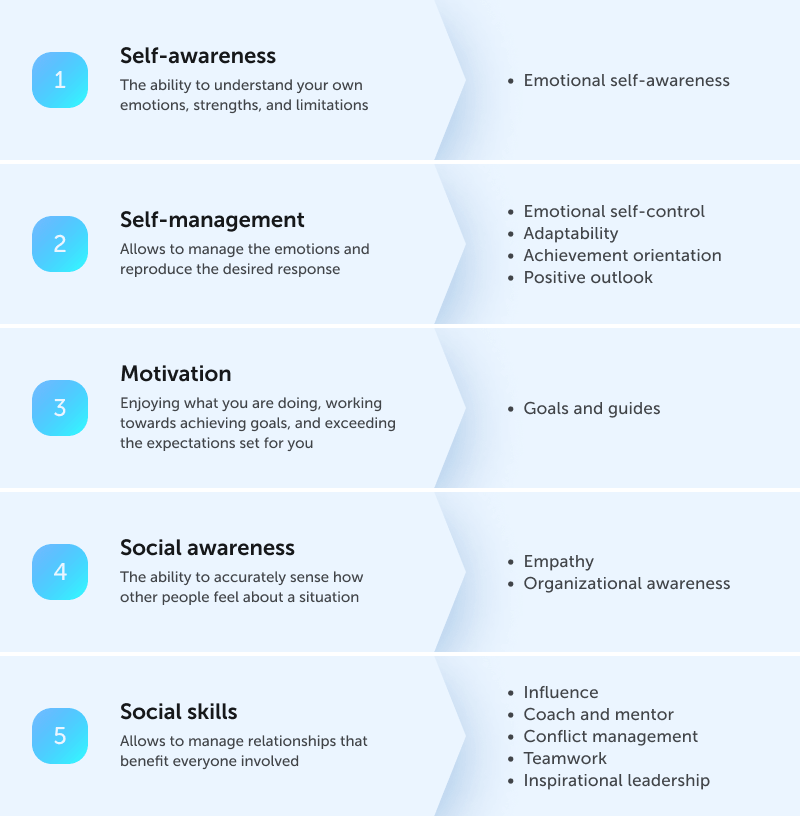
1. Self-awareness
The first pillar focuses on understanding one’s own emotions – knowing what you are feeling and why you feel a particular way. People with high emotional self-awareness can reflect on their:
- Mood
- Strengths
- Weaknesses
- Wants
Self-awareness for people is important to monitor themselves and discover how feelings may affect their actions.
Having self-awareness in the workplace helps staff track their emotions and determine how this may affect their job performance as well as how it may rub off on the colleagues around them.
An example may be an employee who knows they respond poorly to tight deadlines. In response, they always plan ahead and ensure work is completed well in advance.
Self-awareness regarding emotional intelligence manifests itself in decision-making and ethics.
Listening to our emotions helps us sense whether something feels right when making decisions. Combining this intuition with hard data can generate the best decision for a given situation.
It also provides people with an ethical framework to apply to future decisions and actions.
“The Emotional Intelligent Team,” a 2007 book by Marcia Hughes and James Bradford Terrell, broke down emotional awareness into seven steps:
- Individual senses an emotion
- Acknowledges the emotion
- Identifies more facts
- Accepts the emotion
- Reflects on the potential reasons for the emotion occurring at that moment (consider other feelings present or preceding it and what the emotion’s purpose might be)
- Act on the emotion appropriately
- Analyze the response – its effectiveness in the situation and what can be learned moving forward
2. Self-management
Awareness of an emotion is a good start, but the next step is to learn how to manage them and reproduce the desired response. For example, we can all remember a boss or colleague acting impulsively or irrationally without self-management or regulation.
These actions generally produce an undesirable environment where staff cannot perform to their best abilities. They often create emotionally charged workplaces filled with unresolved conflict and resentment, for example, staff can be distracted by poorly managed disagreements and unwilling to collaborate or innovate for fear of repercussion.
Effective self-management in emotional intelligence allows people to handle their emotions better. This means limiting or even reversing the effects of distressing emotions and reaping the rewards of positive emotions.
Negative emotions can affect decision-making and how we act, sometimes crippling employees and preventing them from acting at all.
The goal of self-management is to take emotional responses and recognize them, but not let them hijack your behavior or control how you handle relationships.
As a result, self-management helps employees remain focused, work towards their goals, become flexible in response to dynamic situations, and always be motivated for the tasks to come.
3. Motivation
A vital trait of every leader or successful employee is motivation. Motivated people are driven to achieve goals and exceed the expectations set for them.
High emotional intelligence means this motivation is derived from completing the goal itself, not external factors such as financial reward or status. They have a genuine passion for the job that makes them strive to work hard and perform as well as possible.
Motivated employees enjoy fixing problems and seeking creative challenges. They maintain a positive attitude (even in the face of new obstacles), are always looking to learn, and take pride in their work.
An example of high EI and motivation in the workplace could be a leader overseeing a struggling team. While low emotionally intelligent individuals may look for extenuating factors out of their control to blame for the situation, strong EI means the leader uses it as an opportunity to prove their worth and turn the team around.
4. Social awareness
Social awareness, or empathy, is about accurately sensing how other people feel about a situation. It requires excellent listening skills and the ability to understand people, build a rapport, and become attuned to their body language, tone of voice, and expressions. and expressions.
People with high social awareness can read their colleague’s emotions, relate to them, see the situation from their perspective, and take it into account to make objective decisions.
Empathetic individuals think beyond themselves and remove personal bias to make decisions for a team or organization.
It is important to remember that empathy is not the same as sympathy. It takes other people’s emotions into account to make the best decision based on all the available information.
5. Social skills
The final pillar of emotional intelligence is putting all of this together to enhance social skills and relationship management. This is more than just being friendly and personable. It means taking the emotions of everyone involved to manage social interactions successfully.
EI’s social aspect is often described as “friendliness with a purpose.” For example, social skills help create purpose in a workplace by getting the desired response from a team and ensuring everyone is on board with an idea to make it a success.
Excellent social skills allow leaders to effectively communicate their vision and inspire others to work to their best. It requires them to negotiate, find common ground, and collaborate with a wide range of people.
Strong EI means leaders can sense the reaction to a situation and adapt their response, moving the team in a positive direction. This must be a genuine attempt to find a good outcome for all involved and not an attempt at self-interest and manipulation.
It also leads to improved conflict resolution. EI helps reduce tension when disagreements occur, bringing both sides together to reconcile issues in a positive manner.
Daniel Goleman explains his model with examples and tips
How to improve emotional intelligence in the workplace
There are a number of ways to improve EI and make it a more prominent component of how your business operates. These include:
1. Understanding your emotions
Start by focusing on the first pillar, and learn to be aware of and understand your emotions.
- What emotions do you currently feel about your work or your colleagues?
- How do these emotions affect the people around you?
- Are you letting negative emotions affect the way you interact with colleagues or perform your work?
Becoming more aware of these factors is vital to improving emotional intelligence. A simple tool to get started is to name the emotions you feel as they arise. This helps you recognize them again in the future and begin to track where they affect your behavior.
Once you begin naming and tracking emotions, you can assess your weaknesses – times when you let negative feelings (anger, frustration, apprehension, fear, overwhelmed, jealousy, inadequacy, etc.) cloud your judgment and stop you from performing to your best.
2. Get feedback
Understanding your emotions on your own can be difficult. When it comes to self-analysis, we often have blind spots and struggle to see things in ourselves that would be easy to identify in others.
To overcome this and ensure you aren’t biased in your findings, ask for a second opinion. It could be your boss, colleague, friend, or family, anyone who knows you well and can provide helpful information regarding your response to different situations depending on your mood or emotional state.
You may discover some hard truths you don’t like or want to hear. But learning to accept criticism without becoming offended or defensive is another critical part of developing emotional intelligence leading to two lessons in one.
3. Respond don’t react
When disagreements or conflicts occur in the workplace, many people are prone to emotional outbursts or venting their displeasure.
Emotionally intelligent people learn to stay calm during stressful situations. Instead of reacting impulsively, they take a second to understand their emotions and respond in a more calm manner that gets them closer to a resolution rather than making the situation worse.
The emotional intelligence of team leaders is also a critical factor in defining conflict management styles.
4. Active listening
Listening and paying attention to nonverbal cues is vital to developing emotional intelligence. Waiting for your turn to speak without taking the time to understand your colleague’s point of view is a quick way to cause issues in the workplace.
Active listening helps prevent misunderstandings, shows the proper respect to the person speaking, and gives you the best chance of responding appropriately. It is also an excellent starting point for employees to improve their communication skills.
5. Practice
Unfortunately, emotional intelligence is not simple. It is also not one single thing. Instead, it is an array of skills that require continual practice. Therefore, to truly develop your EI and equip yourself with skills to handle your feelings, you need continual training.
EI requires a high degree of self-analysis, which often means acting differently from your first instinct. Becoming an EI master takes a lot of time and effort, so don’t be discouraged if you don’t see immediate results; keep going and try again the next day.
Tips for implementing emotional intelligence in the workplace
1. Start with yourself
Before improving the emotional intelligence of the wider team, you need to work on yourself. This means studying your own emotions and developing the skills required to harness them positively.
Raising the EI of a workplace requires a leader with extensive knowledge of the subject and experience applying it in real-life situations. See the previous section for techniques to begin working on your EI.
2. Identify employees’ strengths and weaknesses
Employees are more than just their job title or role. They are the product of a series of unique lived experiences that add up to the employee you work with daily. As a result, they have different talents and skill sets that contribute in different ways toward the company’s overall goal.
They also have entirely different emotional responses to their job that affect how they perform and interact in the workplace. Therefore, to get the most out of every employee, you need to understand their emotional intelligence strengths and weaknesses.
While this can be time-consuming and require many resources, including EI tests, it can help quickly identify areas for improvement.
By understanding your employees’ different EI levels, you can design specific training or adapt your management style to interact with each effectively. The goal should always be to accentuate the team’s strengths while alleviating the effects of any weaknesses.
3. Defining workplace guidelines
Every workplace has rules, guidelines, or a formal code of conduct, defining what leadership expects of employees and how they should behave.
Staff emotional intelligence should be a significant consideration when determining guidelines and defining how employees are assigned tasks, communicate with one another, and receive feedback.
The guidelines you implement can go a long way to improving EI in the workplace. Without clear rules in place, poor habits can creep in, increasing the likelihood of poorly managed emotions in the workplace.
4. Give employees a voice
Giving employees a voice, showing them you value their opinions, and responding to any feedback they have, can make staff feel more connected to an organization. This can help improve emotional intelligence by:
- Engendering positive feelings towards the business
- Improving employee communication skills
- Helping leadership become aware if EI issues arise
- Providing an outlet for negative emotions such that they do not build up and create more significant problems
Having frequent back and forth communication with staff members is a great way to understand their emotional state and discover any workplace development issues.
Listening to any frustration or apprehension they have, letting them know it is ok to have these feelings, offering support, and working towards a solution, are good ways to improve emotional wellbeing.
It is also great just to show people you value their opinion and say thank you for their hard work.
5. Assertiveness training
Assertiveness training can help employees handle their emotions and learn how and when to deal with difficult situations.
Becoming more assertive teaches people how to express their feelings constructively and respectfully such that disagreements can be resolved without resentment between parties lingering. This prevents pent-up anger or frustration and goes a long way to stopping future emotional flare-ups.
6. Stress management
Employees also need mechanisms and support systems in place to cope with the stress associated with their job. By investing in team wellbeing and instilling emotional intelligence skills related to stress management, you can avoid burnout and improve job performance even during trying times.
Leaders should understand the stress their employees are under as a vital part of their job. This means being aware of growing workloads, significant upcoming deadlines, and even factors from their personal life that may compound workplace stress.
Whenever possible, you should find ways to alleviate the pressure when someone feels burdened by a considerable amount of stress. This could mean reducing their workload or offering time off, such as a personal/mental health day. However, in the long term, it can be helpful to provide stress management training to help employees deal with high-stress situations better in the future.
7. Employee development
Emotional intelligence is linked with greater job performance and satisfaction. Therefore, improving EI in your workforce can help increase the value of employees, developing them into well-rounded individuals capable of handling greater responsibility.
To do so, organizations need to invest in their employee development, enabling staff to learn new EI skills through L&D platforms and content.
8. Encourage employees to share their emotions
An open work environment where employees are free to share their feelings respectfully has real benefits for an organization.
High emotional intelligence means staff is comfortable sharing their feelings in real-time rather than holding in emotions (potentially leading to an uncontrolled outburst).
For example, if a staff member disagrees with how leadership is handling a new project.
Differences of opinion and an employee feeling angry, frustrated, or mistreated will always occur within an organization. The trick is to find a way for this not to interfere with the work.
An employee unwilling to share their emotions generates resentment, perhaps reducing engagement. However, if they feel comfortable discussing their feelings, managers can better explain their decision or work towards a compromise that improves the project for everyone.
There are many ways to develop an open work environment where staff is comfortable sharing emotions.
During onboarding, make it a priority to welcome new hires and make them feel at home quickly. Strengthen relationships amongst employees through team-building events. Conduct regular check-ins to ensure healthy and open team dynamics.
9. Routine and fact-based feedback
Feedback, positive or negative, is a great learning tool for helping employees develop. However, for it to be effective, everyone in the organization requires the emotional intelligence to give and receive feedback honestly, without judging the individuals involved.
You want to reach a point where regular feedback based on facts helps everyone improve without feeling attacked or personally criticized. This means finding the right time and place for feedback to occur and delivering it respectfully.
For an open work environment to be successful, employees should know that negative feedback with the goal of improving the workplace is welcomed if it is given correctly.
Finally, constructive feedback should always be a dialogue, not a lecture, and come with suggestions for improvement.

Build a learning culture: a practical workbook for your organization
Upgrade your organization’s learning culture with clear, actionable strategies to address the challenges.
Download workbook5 Books to read about emotional intelligence
1. Emotional Intelligence 2.0 by Drs Travis Bradberry and Jean Greaves, 2009
Available on Amazon | eBooks | Goodreads
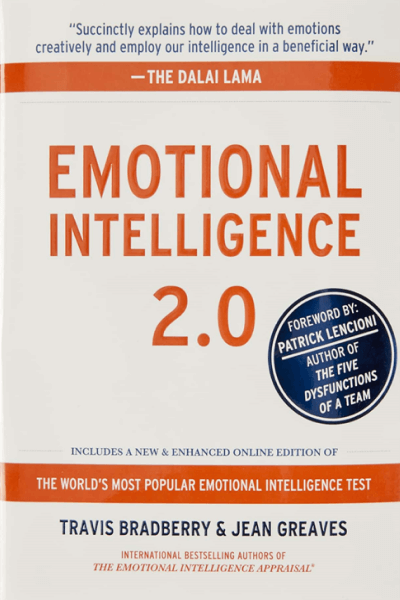
2. Emotional Intelligence: Why It Can Matter More Than IQ by Daniel Goleman, 2005
Available on Amazon | eBooks | Goodreads
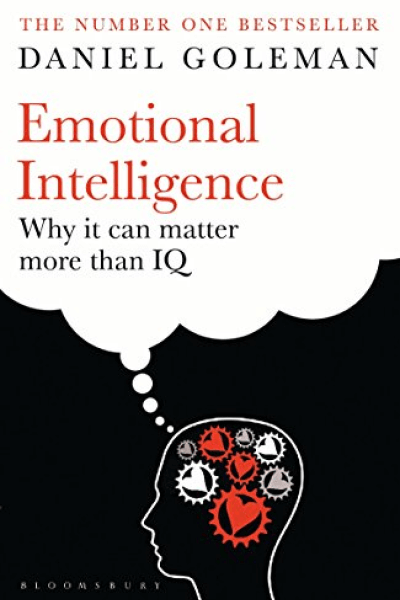
3. Primal Leadership: Unleashing the Power of Emotional Intelligence by Daniel Goleman, Richard Boyatzis and Annie McKee, 2001
Available on eBooks | Goodreads
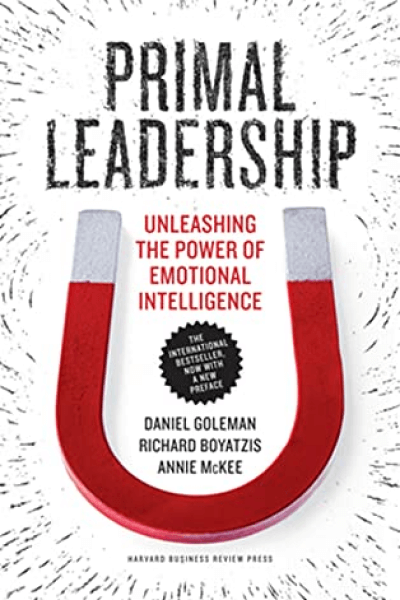
4. The Emotionally Intelligent Manager: How to Develop and Use the Four Key Emotional Skills of Leadership by Peter Salovey,John Mayer and David Caruso
Available on Amazon | eBooks | Goodreads
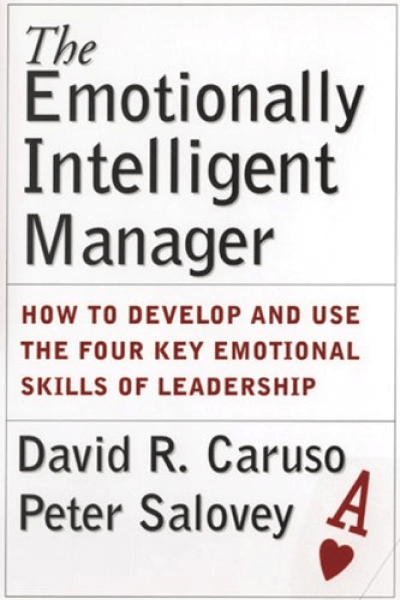
5. Becoming a Resonant Leader: Develop Your Emotional Intelligence, Renew Your Relationships, Sustain Your Effectiveness by Annie McKee, Richard Boyatzis, and Frances Johnston, 2008
Available on Amazon | eBooks | Goodreads
